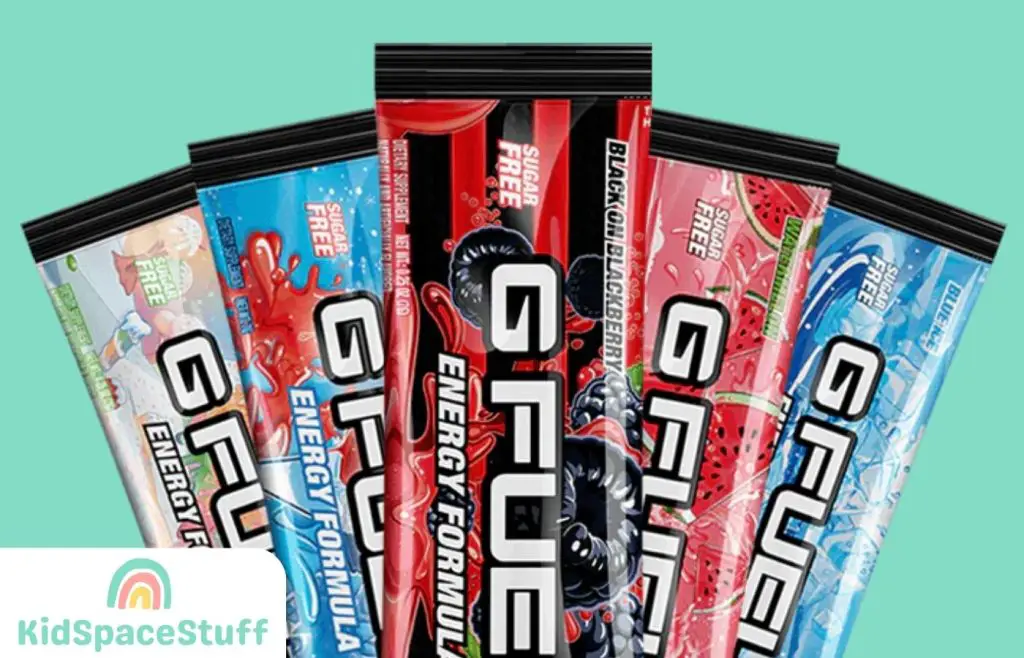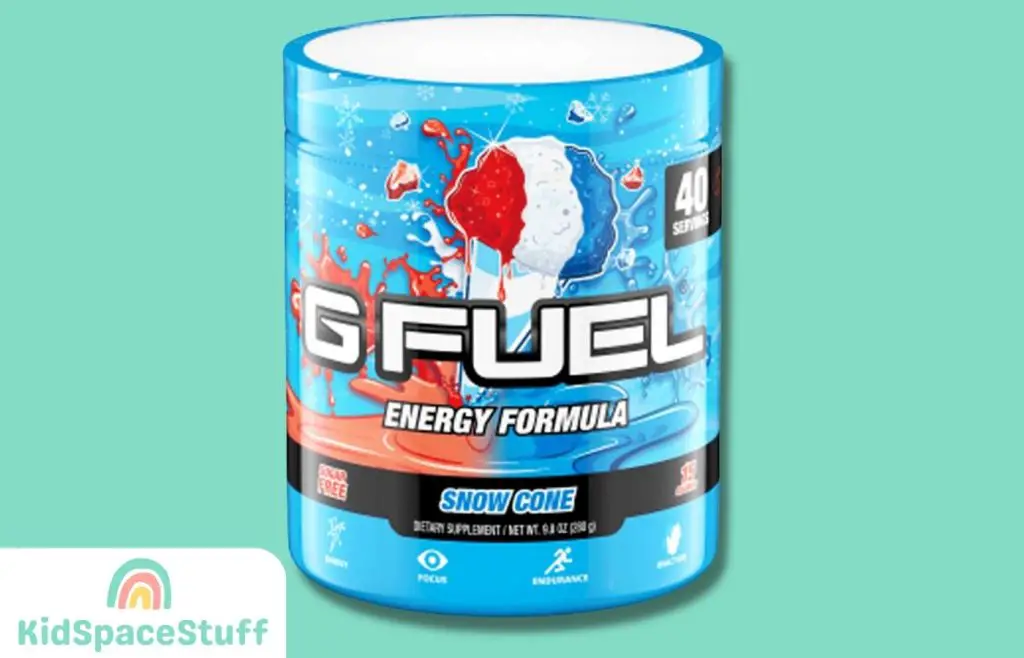GFuel has quickly become one of the most popular energy drinks you can find.
Produced by Gamma Labs in 2012, this energy drink has become a massive success and a staple for many gamers, teens, and even adults.
But can kids drink G Fuel?
In this article, I’ll take a deep dive into the world of energy drinks like Gfuel so you can better understand the ingredients and whether or not it’s safe for your child. Let’s dig in!
Is Gfuel Safe For Kids?
Straight off the bat, the answer is no. Kids should not drink G fuel energy drinks, just like Celsius and other energy drinks.
Pediatricians across the board, including those from the esteemed American Academy of Pediatrics, strongly recommend against children drinking caffeine-infused beverages like G-Fuel.
Gfuel, unfortunately, contains high amounts of caffeine, which isn’t ideal for children.
Caffeine can cause an array of complications in young bodies. Overconsumption could potentially lead to caffeine overdose. It’s also linked to an increase in blood pressure and irregularities in the nervous system.
What’s more, the caffeine in Gfuel might affect the way a child’s body handles nutrition. The process of nutrient absorption is critical to a child’s development. Therefore, Gfuel and its caffeine content could lead to alterations in body weight and overall health.
What is Gfuel?

Gfuel, or G Fuel, is a brand of energy drink produced by Gamma Labs.
Marketed as a healthier alternative to most other energy drinks, Gfuel is a sugar-free, powdered beverage filled with natural ingredients and amino acids. It’s also known for having an energy complex meant to deliver a boost in energy, mental focus, and endurance.
Gfuel has gained popularity, especially among the gaming community, for its performance-enhancing effects and vast array of flavor choices. However, despite the tempting package, Gfuel contains significant amounts of caffeine, which can pose risks, especially for children.
What Is Gfuel Good For?
For adults who consume Gfuel responsibly, it may provide a pick-me-up during long work shifts, intense gaming sessions, or high-endurance workouts. The blend of caffeine, amino acids, and antioxidants is designed to help increase energy levels, improve concentration, and delay muscle fatigue.
Gfuel, being sugar-free, also offers an alternative for adults who seek the energy boost typically associated with energy drinks but wish to avoid the high sugar content that often leads to weight gain. The brand also has a G Fuel Hydration line, which is caffeine-free and focused more on hydration and recovery.
Here’s a great video discussing the effects of energy drinks on your body.
What Age Can You Drink Gfuel?
Typically, Gfuel and other energy drinks are marketed towards adults. Specifically, those over 18 years old.
Children need to have their caffeine intake carefully monitored. Too much caffeine can lead to adverse effects. This becomes especially risky with drinks like Gfuel, where caffeine concentration is high.
As parents, it’s our job to supervise our children’s beverage choices. We need to steer them away from drinks that could have potential health risks. This, of course, includes those with excessive caffeine, like Gfuel.
Check out this guide to understand if kids can drink decaf coffee!
Age Recommendations for Energy Drinks
The American Academy of Pediatrics (AAP) advises against children and adolescents consuming energy drinks. They stress that energy drinks can contain harmful levels of caffeine and other stimulants that can affect a child’s nervous system and cardiovascular health.
As a mom, it’s essential to know these recommendations. Caffeine isn’t just a concern for sleep disruption; in high amounts, it can lead to heart palpitations, high blood pressure, and even seizures.
For children under 12, the AAP suggests a caffeine intake of no more than 2.5 milligrams per kilogram of body weight. Adolescents aged 12-18 should not consume more than 100 milligrams of caffeine per day, which is roughly the amount found in a typical cup of coffee.
Considering GFuel and other energy drinks often contain 150-300mg of caffeine per serving, it’s clear these products surpass the recommended daily caffeine intake for children and teenagers. The safety of these beverages is a serious concern, and it’s always advised to consult with a healthcare provider before allowing a child or teen to consume energy drinks.
Here’s a quick overview of the dangers that every drinks can have for kids.
Gfuel Ingredients
Gfuel contains a myriad of ingredients.
These include various amino acids and a proprietary energy complex that are designed to provide an energy boost without the weight gain usually linked to energy drinks.
However, although Gfuel is sugar-free, it does contain artificial sweeteners. Plus, there’s the amino acid compound, acetyl l carnitine hcl. It’s a naturally occurring compound in our bodies that helps delay muscle fatigue.
Here’s some of the main ingredients found in these popular energy drinks.
- Taurine: An amino acid that’s often found in many energy drinks. It helps with cardiovascular function and development of the nervous system.
- L-Citrulline Malate: A non-essential amino acid that improves blood flow, reduces muscle soreness, and enhances physical endurance.
- Caffeine: A natural stimulant that boosts energy, focus, and alertness. The amount of caffeine in a serving of G Fuel is about the same as a strong cup of coffee.
- Vitamins C, E, B6, and B12: Essential nutrients that play vital roles in energy production, antioxidant defense, and maintaining healthy metabolic and nervous systems.
- Choline: A nutrient that’s involved in various bodily functions, including nerve signaling, muscle movement, and metabolism.
- N-Acetyl-L-Carnitine: An amino acid derivative that helps in energy production and may improve brain function.
- Velvet Seed Bean Extract: A natural source of L-Dopa, which can enhance mood, brain function, and support healthy hormone levels.
- N-Acetyl-Tyrosine: An amino acid that can boost mental performance under stress.
- Adenosine-5’-Triphosphate Disodium Salt (ATP): Often referred to as the “energy currency of life,” ATP is the main source of energy for most cellular functions.
- Extracts of Blueberry, Pomegranate, Pineapple, Apple, Orange, and more: These are packed with antioxidants that may help protect the body against damage from harmful free radicals.
Despite some of these seemingly beneficial ingredients, the caffeine level in Gfuel is high. This makes it a less than ideal choice for children.
How Much Caffeine is in GFuel Energy Drinks?
- GFuel Powder Tub: The powder form of GFuel comes with about 140-150mg of caffeine per serving (one scoop). This is approximately the same as a medium-sized cup of coffee. The beauty of the powder is that you can adjust the amount to suit your caffeine tolerance.
- GFuel Ready-to-Drink Cans: These convenient cans come pre-mixed for those on the go and contain slightly more caffeine than the powder, at around 300mg per can. It’s important to note that this is a considerable amount of caffeine and may not be suitable for everyone.
- GFuel Hydration Formula: This version of G Fuel is caffeine-free, designed to hydrate and replenish lost electrolytes without the caffeine jolt. This makes it an ideal choice for kids or those who are sensitive to caffeine.
Is Gfuel Healthy?

On the surface, Gfuel might appear healthier than other energy drinks. It offers short-term relief from muscle fatigue and helps in energy production. Yet, the high caffeine intake and artificial sweeteners counter these potential benefits. This is especially true for children, whose bodies are still developing.
For adults, Gfuel might be a suitable option as a powdered energy drink for occasional use. However, children should ideally stay away from it.
How Much Sugar Is In GFuel?
Whether you choose the GFuel Powder Tub, the Ready-to-Drink Cans, or the GFuel Hydration Formula, you’ll find zero sugar in any of these. This is a stark contrast to many other energy drinks on the market that are loaded with sugars, contributing to health issues like weight gain and tooth decay.
Still, even though GFuel is sugar-free, it’s important to remember that it does contain artificial sweeteners. While these sweeteners are considered safe by most health organizations, some people may experience digestive discomfort. It’s always a good idea to monitor your reaction after consuming products with artificial sweeteners.
Side Effects of Energy Drinks on Kids
Despite the potential benefits for adults, energy drinks, including Gfuel, can have serious side effects on children. The high caffeine content can cause a range of problems:
- Disrupted Sleep: Caffeine can interfere with a child’s sleep cycle, leading to problems with tiredness and concentration during the day.
- Heart Problems: High caffeine intake can result in increased heart rate and blood pressure. In extreme cases, it can even lead to heart rhythm disturbances.
- Nervous System Issues: Overconsumption of caffeine can lead to nervousness, anxiety, and other mental health issues.
- Digestive Problems: Excessive caffeine can cause stomach discomfort and other digestive problems.
- Nutrition Displacement: Kids may replace nutritious drinks, like milk, with energy drinks, missing out on crucial nutrients for growth and development.
Safe GFuel Alternatives for Kids
Just because GFuel is off the table for kids, it doesn’t mean they can’t enjoy a refreshing, energizing drink.
There are numerous kid-friendly options out there that can offer a quick pick-me-up without the drawbacks of caffeine or artificial sweeteners. Here are a few alternatives I’ve found:
- Water: The best hydration choice is always water. It keeps children well-hydrated, aids in concentration, and doesn’t contain any harmful substances.
- Fruit Juices: 100% fruit juices can be a good source of vitamins and provide a natural energy boost. However, it’s essential to moderate consumption due to the high sugar content in some juices.
- Homemade Smoothies: Blend up fruits, veggies, yogurt, and a bit of honey to create a delicious, energizing smoothie packed with vitamins, fiber, and natural sugars.
- Coconut Water: This is a great natural hydrator, packed with potassium and other essential electrolytes. It’s a perfect drink for active kids just like Liquid IV.
- Herbal Tea: Some herbal teas, such as rooibos and chamomile, are caffeine-free and can be served chilled for a refreshing, calming drink.
FAQs
How Long Does G Fuel Drink Last In Your Body?
G Fuel’s energizing effects typically last around 4 to 6 hours, depending on your body’s metabolism and tolerance to caffeine. The half-life of caffeine in the human body is usually about 5 hours. However, it may take anywhere from 1.5 to 9.5 hours for half of the caffeine to be eliminated, depending on individual variations.
Is G Fuel Bad for You?
G Fuel isn’t inherently bad for you if consumed responsibly by adults. However, it does contain high levels of caffeine, which can pose risks if consumed excessively or by sensitive individuals, particularly children and teenagers. Side effects can include disrupted sleep, increased heart rate, anxiety, and digestive problems. Always follow the recommended intake guidelines and consult with a healthcare provider if you have any health concerns.
Final Thoughts
Even though Gfuel might be more appealing than most other energy drinks, it’s still not recommended for children. The high caffeine content and potential for adverse effects outweigh the benefits.
If you’re looking for ways to boost your child’s energy levels, consider natural, caffeine-free alternatives. And, as always, it’s advisable to consult with a health professional regarding your child’s diet and nutritional needs.
Check out these other kids health articles!
KidSpaceStuff is a site dedicated to helping parents find the best interior design, activities, and inspiration for their kids.